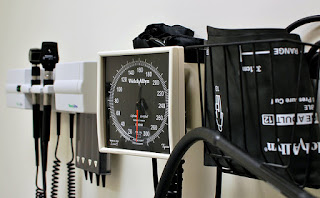Last week, the focus was global hypertension problems. Now, in a North American study, we learn that high blood pressure is often undiagnosed, untreated:
For the study, the researchers measured the blood pressure of almost 1,100 volunteers. The measurements were taken at mobile clinics that the researchers had set up at shopping malls, workplaces, hospitals and community centers in a large city.
The study revealed that 50 percent of the participants were unaware they had high blood pressure. Of these people, 2 percent were at very high risk for health complications.
The findings were published online Jan. 5 in the American Journal of Hypertension.
"What is particularly significant about this study is that a surprisingly large number of participants exhibited some type of hypertensive urgency or emergency," study author Dr. Grant Pierce said in a journal news release. Pierce is executive director of research at St. Boniface Hospital in Winnipeg.
Most of the people with high blood pressure weren't being treated even if they had been diagnosed. The study authors suggested that either these people didn't fully understand their condition, or they didn't understand the health consequences associated with high blood pressure.High blood pressure is the leading cause of strokes. Taking it seriously might save a life.


















